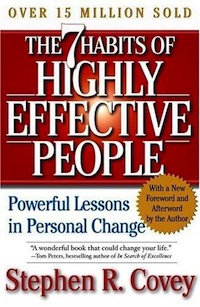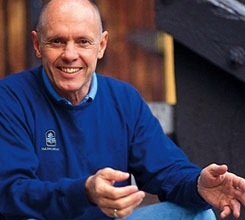 Stephen Covey, author of the megaseller “The Seven Habits of Highly Effective People,” died today (July 16, 2012). He was an extraordinary person.
Stephen Covey, author of the megaseller “The Seven Habits of Highly Effective People,” died today (July 16, 2012). He was an extraordinary person.
I read the book soon after it came out. It remains one of the best books I’ve ever read. Here are the seven habits:
1. Be proactive. Take the initiative in life, and take responsibility for your choices. Control your environment, rather than let it control you.
2. Begin with the end in mind. Know what you want to accomplish.
3. Put first things first. Do what is most important, not what is most urgent.
4. Think win-win. Look for solutions that benefit everyone, rather than solutions that have a distinct winner and loser.
5. Seek first to understand, then to be understood. Listen to the other person’s viewpoint; understand where they are coming from before stating your view.
6. Synergize. Let the strengths of various people combine to achieve something better than any one person could have accomplished. He calls it “creative cooperation.”
7. Sharpen the saw. Balance and renew yourself–mentally, physically, socially, and spiritually.
Those are all good principles. But the one I’ve found most enduring in my own life is Number 5, “Seek first to understand, then to be understood.” I can be reactionary, responding quickly to something I don’t like. But Covey presents a much better path. A path I’ve tried to follow for over 20 years.

Stephen Covey
Largely as a result of learning this principle, I tend to assume the best about people, giving people the benefit of the doubt until I learn otherwise. For example, when I hear of decisions by local government that seem questionable, I step back and remind myself of these things:
- Smart, competent people were involved in making these decisions (I give them the benefit of the doubt in being smart and competent).
- Whatever objections I have, these people have already thought of and discussed at length.
- I don’t have all the facts. They do.
- Don’t criticize until you understand the facts.
- Even then, ask yourself, “Is it really necessary to criticize? What’s to be gained from that?”
- Remember: If I were in their shoes, I would want people to trust my judgment.
I take the same approach at work toward decisions made in local churches or at the denominational level. And I take that attitude toward decisions made in my own church, Anchor. We have smart people with good intentions. They weighed all the pros and cons before acting. While their decision may not set right with me, I need to understand all the facts before criticizing them. In the meantime, I give them the benefit of the doubt–I don’t understand why they did what they did, but I assume it was the right thing. (Unless there’s a past pattern of poor judgment on their part. Example: Congress.)
And I take the same approach in my marriage. When Pam says something that strikes me as wrong, or when she proposes an idea that initally sounds like a bad idea, I try not to respond immediately. Instead, my first reaction is to give her the benefit of the doubt. I’ve trained myself to take a breath and remind myself:
- Pam is very, very smart.
- Pam mentioned it because she thought it was a good idea. She doesn’t suggest stupid things.
- Pam has been thinking about this for a while. I just now heard it for the first time.
- The idea probably has merit. I just need to understand it the way Pam does.
Then, rather than respond negatively or in a knee-jerk way, I ask questions or make comments to discuss and learn more. If it is, indeed, a bad idea, she’ll realize it without me needing to tell her.
At least, that’s how I WANT to respond to Pam. I don’t always. Pam will tell you that. I can be a jerk of the knee-jerk variety.
I do not, unfortunately, take the same approach on Facebook. On Facebook, I remain far too reactionary. So I’ve still got plenty to work on.
But regardless–thank you, Mr. Covey, for being one of those rare writers who have made a lasting impact on my life.






1 Comment to "Thank You, Stephen Covey"